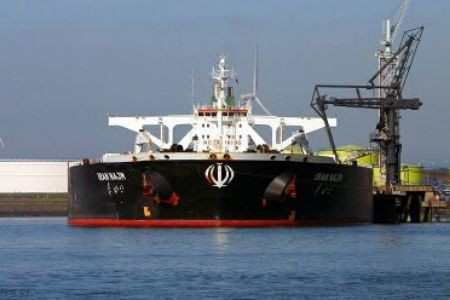Iran Disguises Ships in Cat and Mouse Game with West over Oil Export Embargo
Iran switches names, flags and registered ports of ships to confuse Western officials tracking its oil exports

An oil tanker company with links to the Iranian government has switched the names of several of its vessels in a bid to make it more difficult for Western officials to keep track of their movements.
The National Iranian Tanker Company (NITC), which is owned by Iranian pension funds, has renamed more than 10 of its supertankers, as well as switched their flags and the ports that they use, in advance of an embargo on Iranian oil that is due to start on 1 July.
The Nesa is now being called Truth, the Haraz has been renamed Freedom and the Sima has morphed into Blossom. Some of the vessels' flags from Malta and Cyprus have also been switched to the Pacific atolls of Tuvalu and Tanzania.
The Financial Times reported: "NITC has renamed 24 vessels, more than half of its fleet of 44 tankers, according to official shipping registries."
NITC also exchanged listing of the vessels' ownership with other companies located at the same address in Tehran, while it remains the operator, according to a report from Bloomberg. All the ships were previously registered in either Malta or Cyprus.
The changes were made to some of the largest vessels in the company's fleet, some of which are capable of holding up to 2 million barrels of oil, along with five suezmaxes, each of which has a capacity for 1 million barrels, according to the Equasis shipping database.
Merchant ships must be "flagged" by national ship registries to obtain insurance and gain access to most of the world's ports.
According to ship tracking data on Reuters, two of the renamed oil tankers, Pioneer and Elite, had embarked for Europe within days of the ban on Iranian oil exports being due to take effect.
The Maltese government announced in April that it would remove Iranian-owned ships from its maritime register if they were found to be transporting oil from Syria in breach of UN and EU sanctions.
The government warned the Islamic Republic after a Maltese-flagged tanker reached the Syrian port of Tartus in March and unloaded its cargo, which consisted of 120,000 tonnes of light crude oil destined for China.
The US ambassador to Malta, Gina Abercombie-Winstanley, told the US Senate foreign relations committee that representatives of the Maltese government had assured her they "have taken some steps in the recent past, including agreeing not to reflag any additional Iranian ships, so they will not be reflagging new Iranian ships.
"They have also been supportive of enforcing UN sanctions with regards to Iranian cargo and they have interdicted ships and seized illegal cargo," she added.
NITC is not under US or European sanctions. Although it has declined to comment, it previously said it respects all international conventions.
Its sister company, the Islamic Republic of Iran Shipping Lines, often changes the names of its cargo vessels.
Iranian oil exports have dropped by more than a quarter, or about 600,000 barrels per day, from rates of 2.2 million bopd last year, Reuters reported. A further drop is expected when the EU oil embargo takes effect.
© Copyright IBTimes 2025. All rights reserved.





















